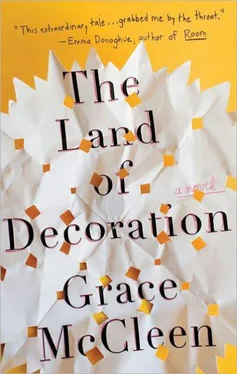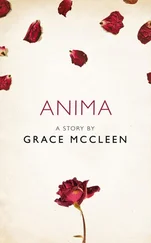Grace McCleen
THE LAND OF DECORATION
A Novel
This is what the Sovereign Lord said to me: “In the day that I chose the nation of Israel I also lifted my hand in an oath to their seed, to make myself known to them in the land of captivity. Yes, I lifted my hand in an oath and I said: ‘I am the Lord, your God.’ In that day I swore to them I would bring them forth from the land of captivity to a land that I searched out for them, a land flowing with milk and honey; it was the decoration of all the lands.”
EZEKIEL 20:5–6
IN THE BEGINNING there was an empty room, a little bit of space, a little bit of light, a little bit of time.
I said: “I am going to make fields,” and I made them from place mats, carpet, brown corduroy, and felt. Then I made rivers from crêpe paper, plastic wrap, and shiny tinfoil, and mountains from papier mâché and bark. And I looked at the fields and I looked at the rivers and I looked at the mountains and I saw they were good.
I said: “Now for some light,” and I made a sun from a wire metal cage strung with beads that hung down from above, I made a sliver of moon and luminous stars, and at the edge of the world I made a sea from a mirror, reflecting the sky and the boats and the birds and the land (where it touched). And I looked at the sun and I looked at the moon and I looked at the sea and I saw they were good.
I said: “What about homes?” And I made one from a ball of dry grass and one from a hollow tree stump and one from a barrel that toffees came in and I gave it a fishing line and sail and made space for a blanket and toothbrush and cup, and a stove, and put a gull high on the mast (which was really a broom handle) and launched it out on the sea (which was really a mirror).
I made houses from chocolate-dip-cookie cartons: the plastic scoop where the chocolate was, that was the bedroom, and the round room below, where the cookies had been, that was the living room. I made houses from a matchbox and a bird’s nest and a pea pod and a shell. And I looked at the houses and saw they were good.
I said: “Now we need animals,” and I made paper birds and wool rabbits and felt cats and dogs. I made furry bears, striped leopards, and fire-breathing, scale-crusted dragons. I made glittering fish and cockleshell crabs and birds on very thin wires.
Last I said: “We need people,” and I modeled faces and hands, lips, teeth, and tongues. I dressed them and wigged them and breathed into their lungs.
And I looked at the people and I looked at the animals and I looked at the land. And I saw they were good.
IF YOU LOOK at the earth from the ground, it seems very big. Stand in a playground and bend down and put your face to the ground as if you were looking for something small, and it seems bigger still. There are miles of concrete going outward and miles of sky going upward and miles of nothing going nowhere in between. Boys playing football are giants, the ball is a planet, girls skipping are trees uprooting themselves, and with each turn of the rope the ground trembles. But if you look down from the sky, the boys and the girls and the ball and the rope seem smaller than flies.
I watch the boys and girls. I know their names but I don’t speak to them. When they notice me, I look away. I pick up a candy wrapper next to my shoe. I will make it into flowers or a rainbow or maybe a crown. I put the wrapper inside a bag and walk on.
Through the concrete, weeds are growing. At the corners of buildings they are pushing through, whittling their way to the light. I wiggle some loose and settle them with soil in a tiny tin cup that held chocolate and a tube that held sweets. They will be planted again and then they will be oaks and pampas and beeches and palms. I pick up a shoelace lying in a puddle. “This will be a hose,” I say. “Or a stream. Or a python. Or maybe a creeper.” And I am happy because in just a few hours I will be back in my room making things.
Then suddenly I am falling; the ground rushes up to meet me, and gravel is biting my knees. A boy is standing over me. He is tall. He has a thick neck. He has blue eyes and freckles and white skin and a nose like a pig. He has yellow hair and pale lashes and a cowlick. Though I don’t think anyone would want to lick him, not even cows, who lick their own noses. Two boys are with him. One takes the bag I am holding. He tips it up and wrappers and laces and can tops blow away.
The yellow-haired boy pulls me up. He says: “What shall we do with her?”
“Hang her on the railings.”
“Pull down her pants.”
But the boy with yellow hair smiles. He says: “Have you ever seen the inside of a toilet, freak?”
A bell rings and, all across the playground, groups of children run to line up at the double doors. The yellow-haired boy says: “Shit.” To me he says: “Wait till Monday,” pushes me backward, and runs off with the others.
When they are a little way off he turns round. He has a sleepy look in his eyes, as if he is dreaming and enjoying the dream. He draws his finger across his throat, then takes off laughing.
I close my eyes and lean against the dustbins. When I open my eyes I pick the gravel out of my knees and spit on them. I hold them hard at the edges to make them stop stinging. Then I begin walking back to the school building. I am sad because I will not be able to make flowers or a stream or an oak tree after all. But what is worse is that, on Monday, Neil Lewis will put my head down the toilet, and if I die who will make me again?
The bell has stopped ringing now and the playground is empty. The sky is lowering. It looks like rain. Then from nowhere a gust of wind rises. It whips my hair and balloons my coat and carries me forward. And tumbling and flapping and fluttering around me go wrappers and papers and laces and tops.
MY NAME IS Judith McPherson. I am ten years old. On Monday a miracle happened. That is what I’m going to call it. And I did it all. It was because of what Neil Lewis said about putting my head down the toilet. It was because I was frightened. But it was also because I had faith.
It all began on Friday night. Father and I were eating lamb and bitter greens in the kitchen. Lamb and bitter greens are Necessary Things. Our lives are full of Necessary Things because we are living in the Last Days, but Necessary Things are often difficult, like preaching. Preaching is necessary because Armageddon is near, but most people don’t want to be preached to and sometimes they shout at us.
Lamb represents the firstborns God killed in Egypt and Christ, who died for mankind. Bitter greens reminded the Israelites of the bitterness of slavery and how good it was to be in the Promised Land. Father says they are full of iron. But I like to think of lambs in a field, not on my plate, and when I try to swallow bitter greens, my throat closes up. I was having more trouble eating than usual that Friday night on account of what Neil Lewis said. After a while I gave up and put down my fork. I said: “What’s dying like?”
Father had his overalls on from the factory. The kitchen light made hollows around his eyes. He said: “What?”
“What’s dying like?”
“What sort of question is that?”
“I just wondered.”
His face was dark. “Eat up.”
I loaded my fork with bitter greens and closed my eyes. I would have held my nose but Father would have seen. I counted, then swallowed. After a while I said: “How long could someone survive if their head was held underwater?”
Читать дальше












